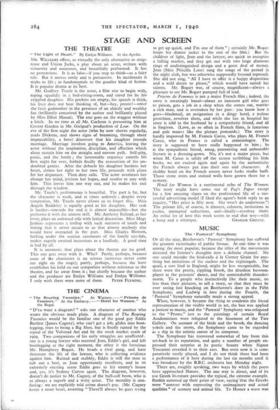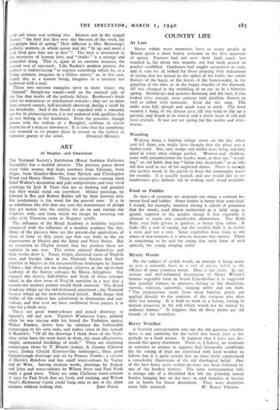MUSIC
The Pastoral ' Symphony
OF all the nine, Beethoven's ' Pastoral ' Symphony has suffered the greatest vicissitudes of public favour. At one time it was among the most popular, because the titles of the movements directed the listener's thoughts into a definite channel. No one could mistake the bird-calls a la Corney Grain for any- thing but imitations of the cuckoo and the nightingale. , The quail, a rare bird in England, might be less recognisable, but there were the pretty, rippling brook, the drunken bassoon- player at the peasants' dance, and the unmistakable thunder- storm. To a people who instinctively like their music, no less than their pictures, to tell a story, so that they must be ever seeing fate knocking on Beethoven's door in the Fifth Symphony, and Ludwig in love during the Fourth, the ' Pastoral ' Symphony naturally made a strong appeal.
When, however, it became the thing to condemn the literal representation of the visible world in art, the ban was applied a fortiori to music, and the ' Pastoral ' Symphony was relegated to the " Proms." just as the paintings of certain Royal Academicians were relegated to the hasement of the Tate Gallery. On account of the birds and the brook, the dancing yokels and the storm, the Symphony came to be regarded as a slip in the artistic career of its composer.
The Symphony has recovered somewhat of late from this set-back to its reputation, and quite a number of people ex- pressed their surprise at its poetic beauty when Signor Toscanini revealed it to their ears. But even now it is com- paratively rarely played, and I do not think there had been a performance of it here during the last six months until it was broadcast by the B.B.C. orchestra last Monday night. There are, roughly speaking, two ways by which the poets have approached Nature. The one way is direct, and of its use Greek literature provides the typical, the extreme example. Ruskin summed up their point of view, saying" that the Greeks were "content with expressing the unimaginary and actual qualities " of scenery and animal life. To Homer a wave was cold salt water and nothing else. Alcman saw in the seagull merely " the bird that flies over the blossom of the swell, the sea-purple bird of spring." How different is Mrs. Browning's pathetic seamew, in whom ocean and sky " lit up and nurst a soul God gave him not at first "! The bird is instructed in the mysteries of human love, and " thinks " it a strange and mournful thing. That is, again in an extreme instance, the second way of approach. Like Ruskin's modem painter, the poetess is endeavouring " to express something which he, as a living creature, imagines in a lifeless object," or, in this case, which she, as a human being, imagines in a creature not endowed with a soul.
These two extreme examples serve to show where the
Pastoral' Symphony stands—well on the classical side of the line that marks off the pathetic fallacy. Beethoven's birds utter no sententious or sentimental remarks ; they are no more than natural sounds, half-jocularly observed, during a stroll by the brookside. And if the brook is regarded with a romantic eye for its picturesqueness, it is not endowed with qualities that do not belong to the inanimate. Even the peasants, though drawn with the realism of a Breughel, conform to classic decencies of a minuet movement. It is time that the symphony was restored to its proper place in esteem as the richest in romantic poetry of the series. DYNELEY HUSSEY.















































 Previous page
Previous page